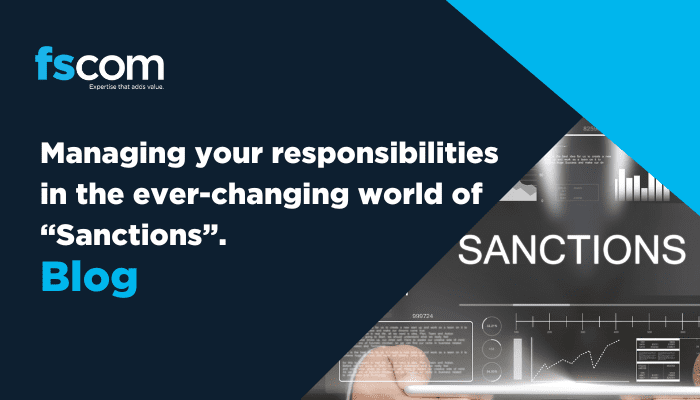
Sanctions against companies and individuals are constantly changing and the pace of change over the last 12 months has been unprecedented.
A major reason is Russia’s invasion of Ukraine, which led to the UK, US, EU and other countries imposing sanctions against certain entities and individuals in Russia. These lists continue to be updated and, as of March 2023, 1,550 Russian individuals and 180 entities were subject to UK sanctions.
This places an increased workload on financial services companies operating in the UK, who must screen customers and third parties against various sanctions lists on an ongoing basis. A sanctions breach could be costly, resulting in financial fines, reputational damages and up to seven years of jail for individual executives.
Fred McDowell, Associate Director in the financial crime team at fscom, recently led a webinar on the sanctions risks and how firms should respond. This blog summarises his advice for firms.
What are sanctions?
Economic sanctions are a coercive measure or action resulting from a failure to comply with a law or rule, or a threatened penalty for disobeying a law. Their aims include stopping an unlawful action, often by coercing a regime or individuals to change their behaviour, and signalling disapproval.
There are three main types of sanctions:
What sanctions should UK firms monitor?
Sanctions are often imposed by the United Nations and then implemented by member states. Countries also impose their own sanctions in addition to those raised by the UK/OFAC etc.
In the UK, the Sanctions and Anti-Money Laundering Act of 2018 empowers the Office for Financial Sanctions Implementation (OFSI) to enforce sanction breaches. Regulated firms should ensure their sanction screening systems have the mandatory listings uploaded and very often will support that with additional sanction listings which are recognised worldwide and reflect jurisdictions where they do business.
How should firms assess and detect sanction risk?
Firms are expected to screen their clients and third parties against sanctions lists. The screening process should alert the compliance team of an apparent match to a client or third party. Firms must then establish whether this is simply a “name match”, or a “target match” whose information matches that information on the OFSI listing. Indicators of a target match include the company’s address, its formation date, and its directors.
Firms should consider five areas to guide and improve their sanctions risk monitoring:
What should firms do in case of a sanctions breach?
Sanctions alerts should be addressed instantly. Firms should follow five steps:
Meanwhile, sanctions continue to change rapidly. On 27 March, the UK government introduced new sanctions targeting those who supply the Myanmar regime with military equipment to bomb civilians. The following day, the UK and US imposed sanctions on individuals linked to trade which funds the Syrian regime.
Contact fscom today to discuss how to improve your sanctions monitoring: Get in touch.
The Payments Association
St Clement’s House
27 Clements Lane
London EC4N 7AE
© Copyright 2024 The Payments Association. All Rights Reserved. The Payments Association is the trading name of Emerging Payments Ventures Limited.
Emerging Ventures Limited t/a The Payments Association; Registered in England and Wales, Company Number 06672728; VAT no. 938829859; Registered office address St. Clement’s House, 27 Clements Lane, London, England, EC4N 7AE.







Log in to access complimentary passes or discounts and access exclusive content as part of your membership. An auto-login link will be sent directly to your email.
We use an auto-login link to ensure optimum security for your members hub. Simply enter your professional work e-mail address into the input area and you’ll receive a link to directly access your account.
Instead of using passwords, we e-mail you a link to log in to the site. This allows us to automatically verify you and apply member benefits based on your e-mail domain name.
Please click the button below which relates to the issue you’re having.
Sometimes our e-mails end up in spam. Make sure to check your spam folder for e-mails from The Payments Association
Most modern e-mail clients now separate e-mails into different tabs. For example, Outlook has an “Other” tab, and Gmail has tabs for different types of e-mails, such as promotional.
For security reasons the link will expire after 60 minutes. Try submitting the login form again and wait a few seconds for the e-mail to arrive.
The link will only work one time – once it’s been clicked, the link won’t log you in again. Instead, you’ll need to go back to the login screen and generate a new link.
Make sure you’re clicking the link on the most recent e-mail that’s been sent to you. We recommend deleting the e-mail once you’ve clicked the link.
Some security systems will automatically click on links in e-mails to check for phishing, malware, viruses and other malicious threats. If these have been clicked, it won’t work when you try to click on the link.
For security reasons, e-mail address changes can only be complete by your Member Engagement Manager. Please contact the team directly for further help.